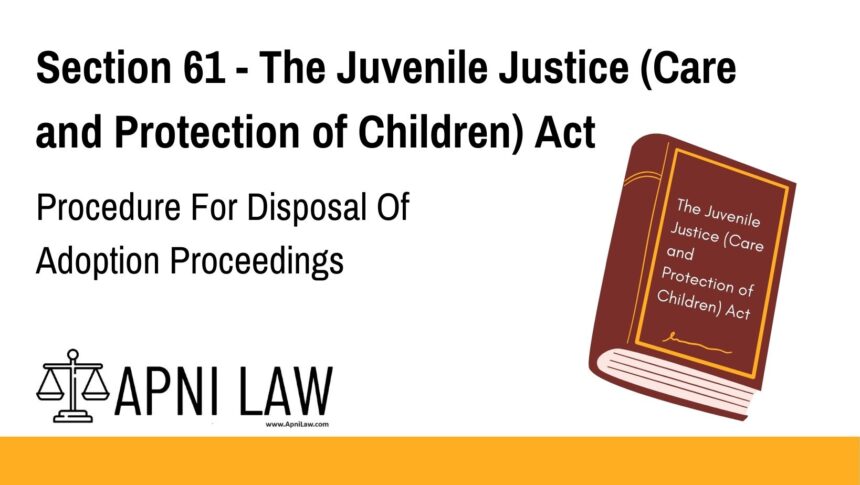Code: Section 61 JJ Act
“(1) Before issuing an adoption order, the District Magistrate shall satisfy itself that—
(a) the adoption is for the welfare of the child;
(b) due consideration is given to the wishes of the child having regard to the age and understanding of the child; and
(c) that neither the prospective adoptive parents have given or agreed to give nor the specialised adoption agency or the parent or guardian of the child in case of relative adoption has received or agreed to receive any payment or reward in consideration of the adoption, except as permitted under the adoption regulations framed by the Authority towards the adoption fees or service charge or child care corpus.
(2) The adoption proceedings shall be held in camera and the case shall be disposed of by the District Magistrate within a period of two months from the date of filing.”
Explanation of Section 61 JJ Act
Section 61 of the Juvenile Justice (Care and Protection of Children) Act outlines the procedure that the District Magistrate must follow before issuing an adoption order. It ensures that adoptions are carried out in a manner that protects the rights and welfare of the child.
Key Points:
- The adoption must promote the welfare of the child.
- The child’s views must be taken into account, depending on their age and maturity.
- No monetary exchange is permitted in consideration of the adoption, except as allowed under legal adoption regulations.
- Adoption hearings must be conducted in camera (privately) to protect the identity and dignity of the child.
- The District Magistrate must dispose of the case within two months of the date of filing.
Illustration
Example 1: Adoption Approved with Child’s Consent
A 10-year-old child living in a child care institution is considered for adoption. The District Magistrate ensures the child understands the situation and willingly consents. After verifying that no illegal payment was involved and that the adoption promotes the child’s welfare, the Magistrate issues the order within the stipulated 60 days.
Example 2: Adoption Rejected Due to Improper Payments
In another case, a couple tries to adopt a child but offers an unauthorized donation to the adoption agency. The Magistrate, upon discovering this, denies the adoption and recommends further investigation as per legal provisions.
Common Questions and Answers on Section 61 JJ Act
1. Who is responsible for conducting adoption proceedings?
The District Magistrate is the designated authority to oversee and decide adoption matters.
2. How long does it take to dispose of an adoption case?
The adoption case must be disposed of within two months from the date of filing.
3. Is the child’s opinion important in adoption?
Yes, the Magistrate must consider the child’s wishes, provided the child is mature enough to express them.
4. Are any payments allowed in exchange for adoption?
No payments or rewards are permitted, except those explicitly allowed by the adoption regulations (such as adoption fees and service charges).
5. Are adoption hearings conducted publicly?
No, adoption proceedings are conducted in camera to protect the child’s privacy.
Conclusion
Section 61 of the Juvenile Justice Act ensures a fair, transparent, and child-centric process in adoption matters. By requiring judicial oversight, time-bound decisions, and confidentiality, it protects the best interests of the child and upholds the integrity of the adoption process.
For in-depth legal analysis and resources on child welfare and adoption laws in India, visit ApniLaw.








